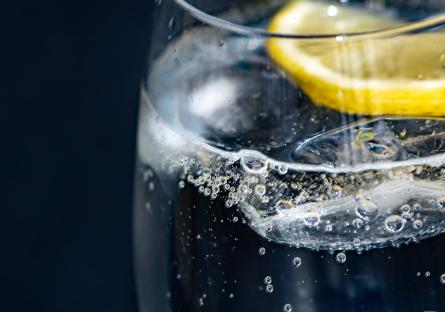This article appears for archival purposes. Any events, programs and/or initiatives mentioned may no longer be applicable.

Fizzy water is big business. Over the last 10 years there’s been a huge increase in sparkling water consumption as people drink more and more seltzers, mineral waters, and other kinds of fizzy water. For folks who have trouble drinking enough water to stay hydrated because of the flat taste of still water, that burst of bubbling carbonation could make a big difference in making water a more fun and flavorful experience. While sparkling water is certainly more interesting for our palates, is it also as healthy as its more relaxed, un-bubbly counterpart? Read on as we look past the fizz to see if sparkling water is as good for you as still.
What’s The Difference?
We all know the essential difference between still and sparkling: the hiss of the open cab tab, the fizzy bubbles, the tickling carbonated sensation of drinking it. Those bubbles come from carbon dioxide, which is the difference maker between sparkling and still water. There are several different varieties of sparkling water, each with slightly different characteristics:
- Sparkling/Seltzer water: Consider this the classic version of fizzy water. This is tap water that’s been filtered and artificially carbonated.
- Mineral water: This is naturally carbonated water, often from springs, that contains minerals like sodium, calcium, bicarbonate, sulfate, magnesium, fluoride, and chloride. Some mineral water is also fortified artificially with carbon dioxide for extra fizz.
- Soda water: Carbonated water that contains sodium bicarbonate and other compounds to maintain its acidic character.
- Tonic water: Mineralized water that contains quinine, which gives the water a more bitter taste.
Does Sparkling Water Hydrate?
The short answer is yes, sparkling water does hydrate as well as still water. When it comes to staying well-hydrated, a few seltzers or mineral waters can be just as satisfying and fortifying as tap water. In some cases, mineral water can be even more hydrating than still water because of the added mineral content.
The fizzy effervescence of sparkling water can be a problem. Studies have found that the fizziness of sparkling water and the feeling of fullness it creates in the body can curb thirst, which leads some people to drink LESS water. This is why relying on sparkling water over still water to hydrate can be tricky: you may end up consuming much less water than you need to stay properly hydrated (which can be a particularly dangerous problem in the summer when you need to drink even more water to compensate for the moisture lost from sweating).
It’s also best to avoid any sparkling waters with added sugar or sweeteners. Sugar can dehydrate and cancel out the positive benefits of drinking water.
Think About Your Teeth
One of the most critical differences between still water and sparkling is their impact on your teeth. Drinking tap water can be beneficial for oral health thanks to the addition of fluoride in the water. The fluoride helps prevent tooth decay by making your tooth enamel more resistant to the effects of acids. It does this by building up mineral content in your enamel. If you're already experiencing tooth decay, a steady amount of fluoride in your diet could stop that decay from worsening. Still water is also sugar-free so you don’t have to worry about it contributing to the formation of cavities.
Sparkling water, while healthy to drink overall, could pose complications for your teeth. For starters: some seltzers contain sugar and/or artificial sweeteners that can have a negative impact on your teeth. The biggest issue with sparkling water is that it’s slightly acidic: that acid content could potentially cause damage to your tooth if you consume it in excess over time. The acids stick to your teeth and eat away at the enamel, rendering your teeth more vulnerable to cavities, infections, and damage from chewing food.
There are ways to mitigate this issue. Quantity and length of time matters when it comes to sparkling water. If you drink only one can a day, experts suggest that isn’t enough to cause problems for your enamel. It’s also recommended that you finish off that quickly rather than sipping it over a long period of time. The reason for this is that drinking a carbonated beverage slowly can interfere with the production of saliva. Saliva helps rebalance the pH levels in our mouths (levels that the acid in sparkling waters throw off-balance), which can help slow down damage to your enamel.
Another step you can take to help counteract the acids in sparkling water is to only drink it during meals. The food will help soak up the acids and keep them off your teeth. Drinking a glass of still water afterward (or rinsing your mouth with it) will wash off any sugars or acids that are still sticking to your enamel.
Go With Your Gut
While still water is good for digestion, sparkling water offers some extra benefits. Studies have found that minerals in sparkling water can assist with bowel movements, improve digestion, and offer relief for constipation. Sparkling water also promotes satiety, creating a feeling of “fullness” in the body that could keep snack attacks at bay.
On the downside: carbonated water could cause bloating. For certain people the carbonation in sparkling water can lead to a build-up of gas in the body and trigger bloating. People who regularly experience heartburn, bloating, acid reflux, or gastroesophageal reflux disease (GERD) may want to limit or eliminate entirely their intake of sparkling water.
Article by Austin Brietta
Want more wellness tips? Check out these stories: